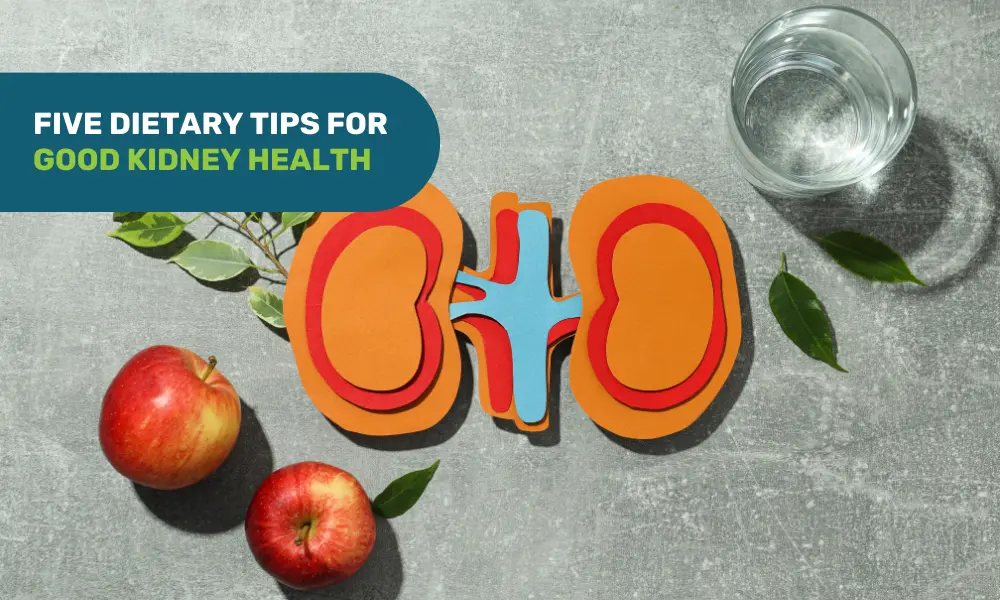Kidneys are one of the most important organs in the body that help to flush out the body’s waste, impurities and other toxins. Maintaining an active lifestyle and having a healthy diet is essential to keep all the organs healthy and have optimal body functioning.
Table of Contents:
-
Importance of Kidneys
-
Causes of Chronic Kidney diseases
-
Dietary tips to reduce the risk of chronic kidney diseases
-
Tips to maintain kidney health
Importance of Kidneys
Our kidneys are pivotal in removing waste and excess water from our blood, maintaining electrolyte balance, and producing hormones needed for bone health and blood pressure control.
In today’s age of fast-paced life and convenience focused choices, the importance of maintaining good kidney health often takes a back seat. This may impact our kidney health and create health complications.
Causes of Chronic Kidney diseases
Some of the causes for chronic kidney diseases include:
-
Diabetes.
-
High blood pressure (hypertension)
-
Heart disease and/or heart failure.
-
Obesity or Overweight.
-
Over the age of 60.
-
Family history of CKD or kidney failure.
-
Personal history of Acute Kidney Injury (AKI).
-
Smoking and/or use of tobacco products.
We must focus on our diet and lifestyle, as these two factors play an important role in organ health. Understanding the profound impact of diet and lifestyle on kidney health is crucial for both the prevention and management of kidney-related issues.
Dietary tips to reduce the risk of chronic kidney diseases
-
A balanced protein diet: While protein is essential for muscle growth and repair, too much can lead to kidney failure. Therefore, one must choose a lean source of protein and monitor intake, it is a must to do especially for individuals with pre-existing kidney conditions.
-
Well Hydrated: Staying hydrated is important for kidney health. Drinking the right amount of water balances body fluids helps eliminate waste and prevents kidney stones.
-
Limit phosphorus and potassium: Kidney function can affect the body’s ability to regulate phosphorus and potassium levels. Many of these substances can be harmful, especially for those with kidney disease. One must consult a nutritionist to determine appropriate dietary restrictions.
-
Sodium and salt intake: A diet high in sodium can raise blood pressure and put additional stress on the kidneys. Reducing salt intake can help improve kidney health, reducing the risk of high blood pressure.
-
Avoid fizzy drinks: Consuming carbonated drinks may increase the risk of renal problems. Soda and cola have empty calories and high sugar content that may lead to formation of kidney stones as well.
Tips to maintain kidney health
-
Control blood sugar levels: Uncontrolled blood sugar level can damage the kidneys. Regulation of blood sugar levels is important for kidney health. Therefore, one must keep a check on blood sugar level and do the required screening regularly.
-
Maintain a healthy weight: Being overweight increases the risk of kidney disease. Weight management through a balanced diet and active lifestyle can help reduce this risk.
-
Regular Physical Activity: Exercise helps maintain healthy blood pressure and improve cardiovascular health, indirectly benefiting kidney function.
-
Avoid smoking and limit alcohol consumption: Excessive alcohol consumption and smoking can impair kidney function and increase the risk of kidney disease.
-
Stress management: Chronic stress can affect overall health, including kidney function. One must practise relaxation techniques like meditation and yoga can help relieve stress and improve kidney health.
Our kidneys play an important role in our overall well-being, and our dietary and lifestyle choices heavily influence our well-being making conscious decisions to stay hydrated, eating a balanced diet, staying physically, and managing stress can help prevent kidney-related issues. Prioritizing kidney health is an investment in our long-term well-being and quality of life. Remember that small changes in our daily routine can dramatically improve the health of these wonderful organs. To consult a nutritionist, CLICK HERE.





